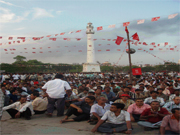Securitas under the spotlight for deplorable labor practices in India

The following stories were run this week in Svenska Dagbladet, a major Swedish newspaper. (there are attachments in Hindi)
Securitas accused of slave-like conditions in India
21 March 2011
Securitas 280,000 employees worldwide are treated very differently, argues the union, accusing the security giant of slave-like conditions and an anti-union attitude.
“I have met people who have not received salaries for months. There is no proof of employment and wage specification, "says Stefan Andreasson, coordinator of the LO-TCO Council in India, to the Swedish daily newspaper Svenska Dagbladet.
In India, the monthly pay is 840 SEK (94.31 Euro) without leave entitlement and sick pay.
Alice Dale, head of UNI Global Union Property says that the global union's view is that Securitas treats their employees well in European countries. But they do not maintain the same standard in many developing countries.
****************************************
Svenska Dagbladet harshly criticizes Securitas
On 21 March 2011, one of Sweden’s leading newspapers focused on Securitas practices in India by saying the following. (excerpt on India)
840 SEK (94.31 Euro) per month, no vacation, no sick pay – are normal conditions for Securitas guards in India. The Swedish security giant with operations in 45 countries and 280,000 employees receives harsh criticism from the union as evidence of abuse and slave-like conditions, focusing particularly on India.
“They are not treated like employees, more like slaves”. Stefan Andreasson, Coordinator at LO-TCO Council in India has for years investigated security guards' conditions in the country and he is highly critical of how Securitas treats its workers.
“I've met people who have not received salaries for months. Proof of employment and payslips do not exist. In addition, Securitas in India has a very anti-union attitude, "says Stefan Andreasson.
Operations in India are run in collaboration between Securitas and an Indian company called Walsons Security. Walsons owns 51 percent of the company and according to the union, this has been Securitas' main argument for not being able to solve the problems.
“I think it’s strange reasoning. Of course they have influence. Securitas is a Scandinavian brand that ought to stand for security and quality. That´s hard to believe when you see how employees are treated.”
After intervention of UNI Global Union, the company has agreed to allow employees to organize, but only in an organization established by the company itself. “That union is completely useless; it is controlled by the company. I am deeply concerned about how they behave. I have met security guards who are terrified of reprisals”.
A survey conducted by UNI among UNI Securitas staff in India shows that unpaid overtime is systematic and that employees do not get paid holidays.
From the replies to a questionnaire we can see that security guards working 12 hour shifts, seven days a week earn approximately 840 SEK a month. As one respondent wrote, “I have no vacation and no sick pay. I hardly see my wife and my children, because I do not get paid if I take time off.”
Suresh Kumar Ranga, who was responsible for the survey, believes that the company exploits poor people's situation in India. Unemployment is very widespread in our country and it is easy to replace a person who is not satisfied. Therefore, few people dare to complain," he says.
The Finnish service union PAM recently had a conflict with Securitas. They argue that the company sent a letter to the employees urging them to change the union when the union called a strike. “It is an attack on the right to organize, said Nancy Lökfors, information officer of PAM.
Jarmo Mikkonen, which is Securitas' country manager in Finland, asserts that the whole thing was a misunderstanding and regrets that the letter which the company sent out was perceived that way.
Alice Dale, Head of Property Services at UNI Global Union says that the global union's view is that Securitas treats their employees well in European countries. But they do not maintain the same standard in many developing countries.
A global company of this size can raise the bar, but we have seen that in many cases they simply become part of the problem and even lower standards.
Swedish Transport Workers' Federation sees Securitas as one of the better Swedish companies with regard to working conditions. Union president, Lars Lindgren said he does not think one can expect that the company should offer the same conditions in other countries as in Sweden.
They act according to local customs. Of course they do some things that are bad, but they do it to keep their market share.
However, Lars Lindgren thinks that Securitas violates the global agreement that they have agreed to follow."
The following attachments have these articles translated into Hindi.![]() SvenskaDagbladet.Securitas.21March2011 hindi.pdf
SvenskaDagbladet.Securitas.21March2011 hindi.pdf![]() harsh criticism 21march hindi translation kriti.pdf
harsh criticism 21march hindi translation kriti.pdf ![]() Aftonbladet.Securitas.22March2011 hindi translation kriti.pdf
Aftonbladet.Securitas.22March2011 hindi translation kriti.pdf ![]() SvD Securitas response.21March2011.EN rev hindi translation kriti.pdf
SvD Securitas response.21March2011.EN rev hindi translation kriti.pdf

